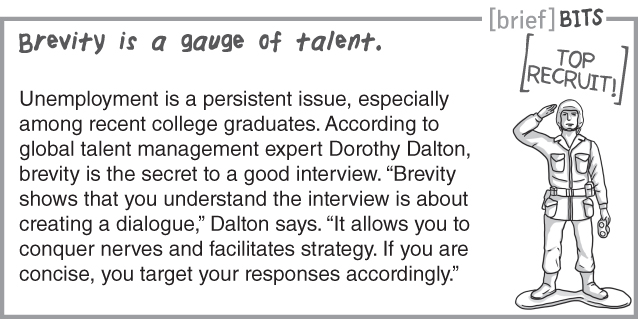Chapter 17
Help Wanted: Master of Brevity
Talk to the point and stop when you have reached it.
—F. V. Irish
Long story, short. Interviews are moments to have controlled conversations, not nervous monologues.
Not the Time for Anxious Rambling
Even the most well-prepared and accomplished professionals go into job interviews nervous and self-conscious.
Brevity plays a key role during an interview. It helps you stand out clearly from the others, ask good questions, and listen.
When people get nervous, they start talking—a lot. If you've ever interviewed people, you can see it as they ramble on about themselves. They want to get as much information across as they possibly can.
An interview is a time for control, discipline, and awareness. Don't pour it on. Make a positive impression in the first 5 minutes. Stay in the moment, and be in a conversation.
You may be the best candidate in the world on paper. But if you're not careful in person, you can flush away everything that you've worked for.

Brevity is your weapon—and it starts with the résumé. Trim it, highlight your successes, and put them in context. Don't give them five pages about your entire professional and educational history. Write a good, pointed cover letter that leaves your interviewer with that single defining idea of why you're the best fit.
Good interviews live the principles of BRIEF. You are short and to the point. ...
Get Brief: Make a Bigger Impact by Saying Less now with the O’Reilly learning platform.
O’Reilly members experience books, live events, courses curated by job role, and more from O’Reilly and nearly 200 top publishers.

